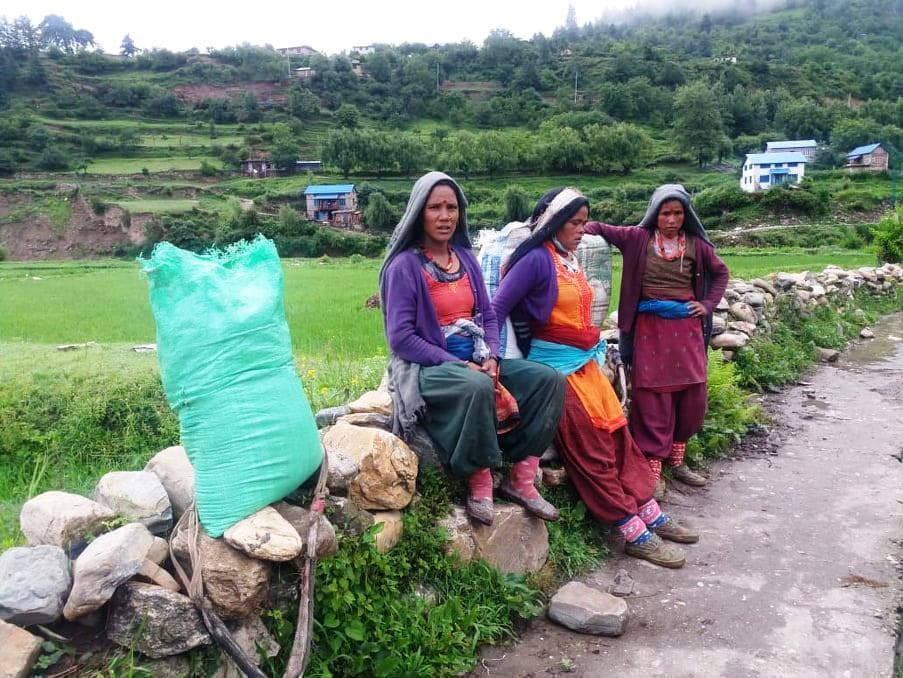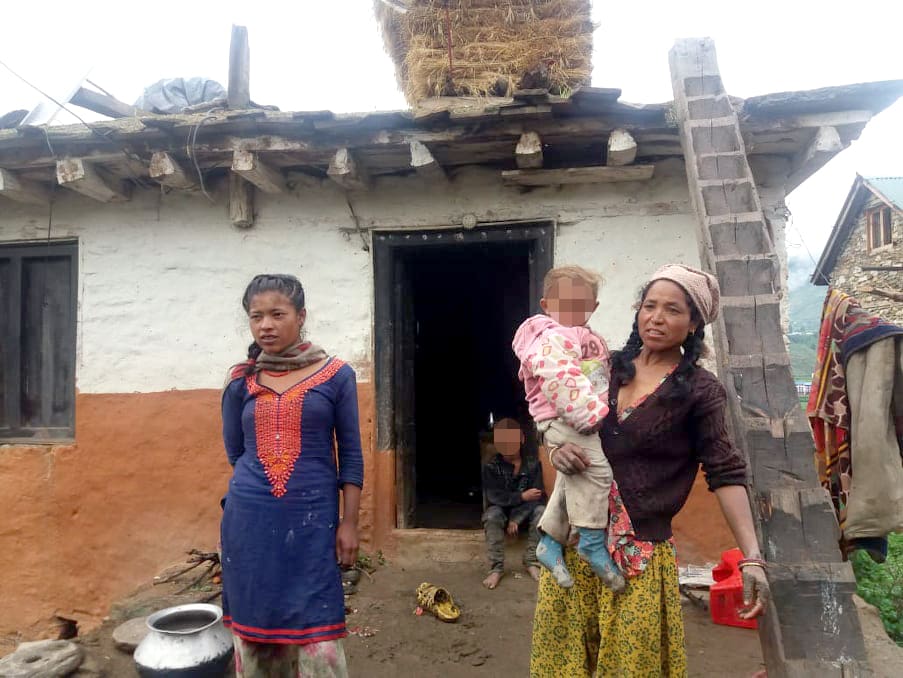Women, who have returned from various places, including India, are facing stigma and discrimination from society, including their own family, even after staying in quarantine for 14 days, and testing negative for the coronavirus.
Krishnamaya Upadhyaya: Center for Investigative Journalism-Nepal
Nanda Sunar, a resident of Tila Rural Municipality-4, stayed at the Covid-19 quarantine facility setup at the local Saraswati Secondary School after returning from India. She stayed there for 14 days and underwent polymerase chain reaction (PCR) testing for coronavirus. After the result came negative, she went home on July 5.
However, her troubles started again from the day she returned home. Sunar doesn’t feel at home even after returning to her village. There are various development projects going on in the village, but she can’t see what’s happening. She has also been barred from going to the community tap or meeting her neighbours for a chat. Sunar said, “Even the house feels like a prison now.”

Women in Jumla have been working normally while those who have returned home from quarantine facilities are being discriminated against. Photo: Krishnamaya Upadhaya
Other women in Jumla are also facing a situation similar to that of Sunar. Vimala Sunar, a social mobiliser in Tila, said, “All women who have returned home from the village quarantine are facing the same stigma.”
After returning from India, Pavitra Sarki of Tatopani Rural Municipality-1, Jumla, also stayed in quarantine and returned home after testing negative. But she hasn’t been able to work on her own farm. Neighbours haven’t allowed her to move around the village, saying that coronavirus is being transmitted by people who have returned from India.
“We endured a lot of hardships while in quarantine. Now, we have to endure the same discrimination after returning home,” said Sarki. “We have to go to the forest and the farm way more than the men need to, and things are not easy for us.”
Many members of the community are unwilling to accept that a person who has stayed in quarantine and tested negative is as healthy as a normal person and can return to regular work. In a society where women are discriminated against on the basis of culture and tradition, women are now being discriminated on the pretext of the virus. For example, Pushpa Rawal of Jumla’s Sinja Rural Municipality stayed inside the house like a prisoner after returning home from Surkhet. Even after staying in quarantine for 14 days and returning home with a negative test result, she hasn’t left her house due to society’s fear.
“People hurl curses if I step outside,” said Rawal. “The other women who came with me are just as afraid.” Rawal asked, “There are no restrictions on men. Why are we women discriminated against?”
What is happening in Chandannath Municipality- 3 is also an example of how women are being discriminated against, at large. When a local man tested positive for coronavirus, he was sent to hospital. But even after his family members, including his wife, tested negative the neighbours and the villagers restricted his wife from going out of the house, and visiting her farm.
According to Om Prakash Devkota, assistant chief district officer, 2,693 people who had returned to the district and stayed in quarantine have gone home after receiving negative reports, as of July 12. According to health coordinators working for the lone municipality in the district and five other rural municipalities, 560 of them are women.
As of July 13, twenty-two men and four women are still staying in quarantine facilities in Jumla. According to Karnali Academy of Health Sciences, Jumla their swabs have been collected for testing, but results are yet to come in. Thirty-six people have tested positive for coronavirus in the district so far.
Jumla’s quarantine centres are gradually being emptied. But the number of women returning home from quarantine and facing stigma in society has been on the rise. Samiksha Budha returned home after spending 14 days at a quarantine set up in a tent in Jharjwala, Guthichaur Rural Municipality-3. She is disgusted by the way she is being treated in the village. “I came home after suffering a lot while in quarantine. But even when I was at home, I had to face discrimination at the hands of society again, ”she said on July 4. She added, “Currently, the Prime Minister’s Employment Programme is running in the village and various works such as digging of roads is taking place. I was told not to come because I could spread corona. ” She is sad that she lost an opportunity to earn.
“We did whatever the health worker told us to do while in the quarantine. It’s heartbreaking to be treated like this even when after coming home,” said Budha.
Illiteracy and discrimination against women have plagued Budha and other women like her as they are forced to endure whatever injustice is done to them. The women of Jumla are not even aware that they have to fight the discrimination. For example, Mannu Kathayat, who returned home after staying in quarantine at the local Ganesh Basic School in Rankagaun, Tatopani Rural Municipality-1, has not been allowed to fetch water from the community tap. Her family did not allow her to go out fearing repercussions from society. “But I don’t have the courage to ask why I wasn’t allowed to go out.” Mannu said, “How can I raise my voice alone?”
12 percent households led by women
In Jumla, on average, more than 12 percent of households are led by women, according to the Karnali State Government’s booklet ‘Karnali in Statistics’. This shows that discrimination and stigma against women affect not only one woman, but also the entire family. According to Khemraj Shahi, an official at the Agriculture Development Office, Jumla, 85 percent of women in Jumla are engaged in agriculture. As such a large number of women, who have returned from quarantine are not being allowed to go out of the house, this has created major obstacles for agriculture. As women have not been allowed to go out of the house even during the onset of the farming season, it has naturally had a negative impact on agriculture.

(l) Sharmila Nepali and (R) Saru Nepali outside their homes. The two returned home after staying in quarantine for 14 days after returning from India.
Advocate Padma Bahadur Shahi, a central member of the Nepal Bar Association, said that it was illegal to discriminate against those who returned home after staying in quarantine facilities. Shahi said, “It’s against the constitution to discriminate against women who follow safety measures [while in quarantine]. Article 38 of the constitution mentions that women cannot be discriminated against on religious, social, traditional, customary or any other grounds. ” According to advocate Shahi, the constitution guarantees the right of women to receive compensation if they lodge complaints against discrimination.
Chandannath Municipality Chief Kantika Sejuwal also said that women should object if they are discriminated against when they return to work after wearing a mask, using sanitizer, washing their hands with soap and water and maintaining social distance. He said that if the discrimination does not stop even then, a complaint should be lodged with the concerned body. Chief Sejuwal said, “We have not received such a complaint so far.”
Why are women who have returned home after testing negative being discriminated against? It seems that people believe that corona spreads in the village when returnees roam the village. However, some victims say that the weak and voiceless are being targeted in the name of the virus. The well-off and powerful lot of the village don’t even have to stay in quarantine after returning home. Many of them have been sent home to stay in ‘home quarantine’. They are living with their families because the structure of their house doesn’t allow them to live separately. Social distancing is limited to formalities.
An example of this is Rabindra Kathayat, 22, of Tatopani Rural Municipality-6, who returned from abroad on June 26. He is currently living in his house in Chandannath Municipality-6. He said without any fear, “There are no arrangements to stay separately, so I am staying with my family.”
Kathayat returned to Nepal from Pakistan on June 22. When he arrived in the village, he thought that he should stay in quarantine. However, he was relieved when the local people’s representatives asked him to stay in his own house under ‘home quarantine’.
According to Kathayat, other people from Jumla, Dolpa and Kalikot who had returned along with him also haven’t been tested until mid-July. Kathayat said, “I can easily stay at home. But I fear that I am putting my family at risk. ”
Prem Acharya of Chandannath Municipality-1, Acharya Bada, who arrived in Jumla on the same vehicle as Kathayat, is also staying in his own house. “We said we would quarantine, but the people’s representatives said we could stay in our own homes,” Acharya said. “I haven’t been tested. I fear that my family may be at risk because of us.”
Most people who entered Jumla from outside after the lockdown was eased, haven’t stayed in the quarantine, and this could spread the corona infection to the community, explained Dr Mangal Rawal from the Karnali Academy of Health Sciences. “The local government should take it seriously,” he said. “The quarantine centres in the district are empty. It is not good to send returnees to home quarantine.”
When asked why are local governments sending returnees home?, ward chairman of Chandannath Municipality-6 Auj Bahadur Rawal said, “We have already spent the money we had on quarantine management. Now, they have been sent to live in their own homes as we can’t bear additional financial burden.” Ward chairman of Chandannath Municipality-1 Jaya Bahadur Rawal also said that they started sending everyone home as it was impossible to keep them in quarantine.



